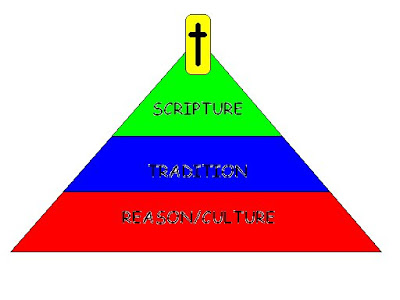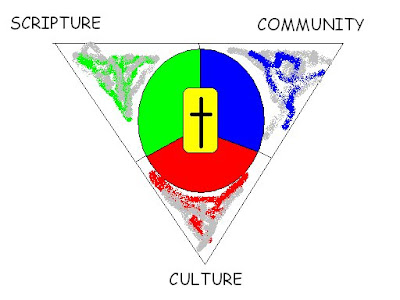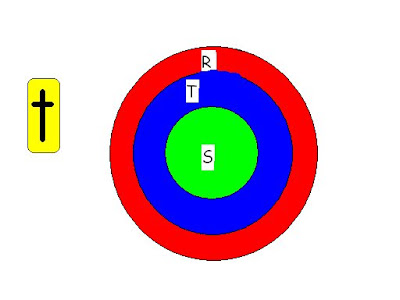I preached this three years ago, on the texts that have come round again for tomorrow morning. After the service I was told that I was ‘very brave’, but reading it through again I’m not sure that I was…
20041219A virgin shall conceive
I like to think of myself as quite a conservative sort of Christian. That is, although I came into the church through the liberal door, I have found that the more I study the faith, the more comfortable I find myself with the classical formulations, and the greater weight I place on the Church Fathers and how they understood what Christianity is all about. However, although I’ve come quite a long way from my liberal beginnings – to the extent that I would now find it quite an insult to be labelled as a liberal – there is still one area where I can’t quite overcome that liberal inheritance. And our readings this morning bring my one remaining qualm directly to the surface.
Let’s begin with Isaiah. In our Old Testament reading this morning the Prophet Isaiah is predicting the birth of a child to a young woman. The political context is quite fraught, and I shall give a rapid explanation – those of you who have been coming to the Learning Church sessions will recognise some of this. Isaiah is writing in the 8th century BC, and this is a time when the united kingdom under David and Solomon had split into two Jewish kingdoms, Israel in the North and Judah in the South. Assyria was the rising local superpower, and Israel and the neighbouring state of Damascus were seeking Judah’s assistance in fighting against Assyria. The king of Judah, called Ahaz, didn’t want to go along with this, and so Israel and Damascus besieged Jerusalem, to try and engineer regime change and the installation of a more favourable ruler. Now the issue confronting Ahaz is whether he should seek a political alliance with the Assyrians, to defend his own position, or whether he should trust in God for protection – and as you can imagine, Isaiah is quite clear about the choice that should be made. Isaiah says to Ahaz that a young woman will give birth to a child, and before that child has come to maturity, the powers that threaten Ahaz will have been defeated. What Isaiah is doing is setting a time frame for how long Ahaz would have to wait – and, indeed, less than twelve years later, before such a child would have reached maturity, the kingdoms of Damascus and of Israel have been defeated by Assyria. So in Isaiah, there is no sense of the birth-process being somehow miraculous; indeed, had Isaiah wanted to make a point about virginity, he would have used a different word. That is, he uses the word ‘alma, meaning young woman, instead of the word betula, which would have specifically meant virgin.
So where has Matthew got his text from? For clearly, in verse 23 he is quoting Isaiah as referring to a virgin conceiving a child. The answer to this is quite straightforward. In the third century in Egypt, following the expansion of Greek culture after Alexander the Great, the Hebrew bible was translated into Greek, and it was the Greek text that Matthew was quoting from, not the original Hebrew. And the Greek text translated the word meaning ‘young woman’ with the word parthenos, meaning virgin. So, in the translation from Hebrew to Greek, the element of virginity has been brought in, and it is this which underlies Matthew’s text. For it is very important to Matthew to establish the way in which Jesus is the fulfilment of Old Testament prophecies. Five times in these early chapters Matthew uses the expression ‘this took place to fulfil what had been spoken by the prophet’. Matthew is talking to an audience of Jewish Christians, and he is very concerned to establish the connections between the Old Testament and the New Testament – think of the Sermon on the Mount echoing Moses on Mount Sinai for example – and this is guiding his interpretation here.
So where does that leave the doctrine of the virgin birth? Well, within Greco-Roman culture the story of the origins of an heroic figure was quite a well-established form. Hercules, for example, was given the story that his mother was impregnated by Zeus, and this accounts for his superhuman strength. And of course, in our own day, the same understanding can be seen in children’s comics. Think of Superman – his wonderful powers require an explanation, and that is given by his origin on the planet Krypton. The real truth about Superman is that he is not one of us.
Which brings me to what my real qualms about the virgin birth consist in. For the standard liberal argument against it is to simply say ‘that sort of thing doesn’t happen’. That doesn’t carry much weight with me, largely because I don’t give science and scientific explanations the importance that our culture does – they are much too partial and prejudiced to be substituted for religious truth. If the living God could raise Christ Jesus from the dead – which is something, let me be clear, I’m quite happy with – then I can’t see any reason why the much less difficult matter of a virgin birth should be beyond Him. No, my worries come from a different direction.
One of the images in the New Testament which means the most to me is the tearing of the curtain in the temple. I read this as the abolition of the dividing line between God and humanity, that in Christ, the one who is both fully human and fully divine, this division is overcome, and all of the religious obstacles that had been put in the way of a living relationship with God – all of the Pharisaic legal traditions, the money changing in the temple, the religious purity laws – all of these have been overcome through Christ who is, as the letter to the Hebrews puts it, the pioneer and perfecter of our faith. But Jesus can only do all this if he is in fact human in the way that we are human. The church father Gregory of Nazianzus put it like this: what he has not assumed, he has not healed. In other words, if Jesus was like Superman – who appeared to be from earth but was actually from the planet Krypton – then he cannot save. He cannot take on the burden of our sins and he cannot show us the way of life. For where Supermen can go, mere mortals cannot go. So my worry about the virgin birth is not at all that it was impossible. My worry is that it diminishes Christ’s humanity, and that means that he is no longer my friend, he is no longer the one who can speak to me as a brother; instead he is an alien, totally other. I can’t reconcile my faith with that.
However. I should reiterate that my worries on this score make me unorthodox, and that means that not only am I officially wrong on this, but, if the past is any guide, in a few years time I will, through God’s grace, have gained understanding of the mystery of the virgin birth, and accepted it. If that proves to be the case, I promise to come before you again and explain the how and why.
But in the meantime I struggle with texts like the one we had this morning from Matthew. I wrestle with my doubts, I try and reach some sort of understanding that will make the texts come alive with meaning for me, in the way that the tearing of the curtain in the temple speaks to me. What gives me joy is that I work in a church which isn’t afraid of this sort of exploration, that instead teaches us that our reason is a gift from God, which, if we let it, will lead us further into the mystery of our salvation, and the truth of the Incarnation of the Son of God, whose festival we shall be celebrating together at the end of this week. And surely that is the right way, for in Christ all truth finds its expression, and if we hold fast to truth, we will always come back to him. For Jesus Christ is our Saviour, the one ‘declared to be Son of God with power according to the Spirit of holiness by resurrection from the dead’. May he guide us into all truth, throughout this Christmas time, and always. Amen.




